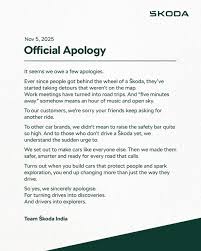
By Newswriters News Desk
In a bizarre twist of corporate communication, India’s biggest brands are flooding social media with tearful “official apologies” – not for scandals or slip-ups, but for being too damn good at their jobs. From auto giants to snack behemoths, the “Sorry, Not Sorry” trend has ignited a viral frenzy, turning remorse into reels and regret into retweets. What started as a cheeky global gimmick is now a full-blown Indian phenomenon, racking up millions of views and redefining brand banter.
The spark? Skoda India lit the fuse last week with a mock missive: “We regret to inform you that our cars are so reliable, they’ve caused unintended detours in your daily commute.” Volkswagen swiftly followed, lamenting vehicles “too hard to part with,” while Reliance Digital confessed to “disrupting budgets with unbeatable deals.” Adani Ambuja Cement took it to absurd heights, apologizing for cement so sturdy “customers can’t drill holes or hang pictures – we’ve fortified your homes beyond repair.” Even Haldiram’s joined the chorus, sorry for “bhujia so addictive it’s hijacking snack times nationwide,” and Myntra for “outfits so stylish, wardrobes are in chaos.”
This isn’t contrition; it’s calculated cleverness. Originating in the Philippines last year as a playful nod to overachieving products, the trend exploded globally before crashing India’s Instagram feeds. T-Series, the music label powerhouse, quipped an apology for “causing serious distractions with earworm hits,” while celebrity chef Ranveer Brar fretted over recipes “so delicious they’ve sparked a national cooking epidemic.” PVR Inox, Keventers, Cashify, Garnier, and even telecom titans like Jio and BSNL piled on, each twisting the formal apology template – complete with bullet points and faux legalese – into a self-deprecating love letter to their successes.
Why the rush to repent? Marketers call it “moment marketing” at its finest: a low-cost, high-engagement ploy that humanizes brands in an era of algorithm-driven authenticity. “It’s about flipping the script on corporate stiffness,” says digital strategist Priya Sharma of BuzzWorks Agency. “Consumers crave relatability – 93% say brands must vibe with online culture, per recent surveys.” The posts aren’t just funny; they’re shareable gold, boosting visibility without ad spends. Skoda’s reel alone garnered over 2 million views in 48 hours, sparking user-generated parodies from startups like Frido and Nat Habit.
Yet, not everyone’s laughing. Critics decry it as gimmicky overkill, diluting genuine apologies for real missteps – think past boycotts over quality lapses at Patanjali or ethical slips at Malabar Gold. “Apologies should signal accountability, not attention,” warns consumer advocate Nidhi Gupta. Still, the trend’s traction is undeniable: engagement rates are soaring, with #ApologyAd trending nationwide.
As Diwali fireworks fade, this sorry saga shows no signs of stopping. In a market where virality trumps vulnerability, brands are betting big on banter. After all, in the court of public opinion, a witty “oops” might just be the best defense. Will it evolve into something deeper, or fizzle like last year’s memes? For now, India’s ad world is united in mock mourning – and loving every guilty-pleasure minute.



